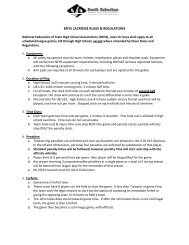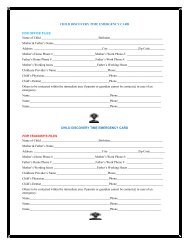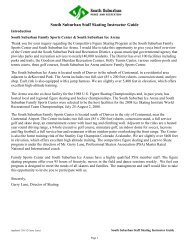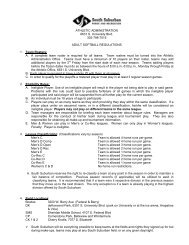- Page 1 and 2:
2012 Budget South Suburban Park & R
- Page 4:
BUDGET GUIDE This budget guide is a
- Page 7 and 8:
South Suburban Park and Recreation
- Page 9 and 10:
Letter of Transmittal 9
- Page 11 and 12:
The staff from each department deve
- Page 13 and 14:
Operating revenue reflects an incre
- Page 15: Personnel The 2012 Budget includes
- Page 18 and 19: South Suburban Park and Recreation
- Page 20 and 21: South Suburban Park and Recreation
- Page 23 and 24: Mission and Goals 23
- Page 25 and 26: South Suburban Park and Recreation
- Page 27 and 28: South Suburban Park and Recreation
- Page 29 and 30: South Suburban Park and Recreation
- Page 31 and 32: South Suburban Park and Recreation
- Page 33 and 34: Finance (continued) South Suburban
- Page 35 and 36: South Suburban Park and Recreation
- Page 37 and 38: South Suburban Park and Recreation
- Page 39 and 40: South Suburban Park and Recreation
- Page 41 and 42: South Suburban Park and Recreation
- Page 43 and 44: South Suburban Park and Recreation
- Page 45 and 46: South Suburban Park and Recreation
- Page 47 and 48: South Suburban Park and Recreation
- Page 49: Golf Department (continued) Accompl
- Page 52 and 53: South Suburban Park and Recreation
- Page 55 and 56: Summary of Significant Financial Po
- Page 57 and 58: South Suburban Park and Recreation
- Page 59 and 60: South Suburban Park and Recreation
- Page 61 and 62: South Suburban Park and Recreation
- Page 63 and 64: South Suburban Park and Recreation
- Page 65: South Suburban Park and Recreation
- Page 69 and 70: Capital Improvement Plan 69
- Page 71 and 72: South Suburban Park and Recreation
- Page 73 and 74: South Suburban Park and Recreation
- Page 75 and 76: South Suburban Park and Recreation
- Page 78 and 79: Combined Financial Statements Gover
- Page 80: District Residents District Organiz
- Page 84 and 85: SOUTH SUBURBAN PARK AND RECREATION
- Page 86 and 87: SOUTH SUBURBAN PARK AND RECREATION
- Page 88 and 89: SOUTH SUBURBAN PARK AND RECREATION
- Page 91 and 92: SOUTH SUBURBAN PARK AND RECREATION
- Page 93 and 94: SOUTH SUBURBAN PARK AND RECREATION
- Page 95: SOUTH SUBURBAN PARK AND RECREATION
- Page 98 and 99: SOUTH SUBURBAN PARK AND RECREATION
- Page 100 and 101: SUMMARY OF POSITIONS BY DEPARTMENT
- Page 102 and 103: SUMMARY OF POSITIONS BY DEPARTMENT
- Page 104 and 105: 2012 CAPITAL REQUESTS SUMMARY Distr
- Page 106 and 107: Routine District Partner or Nonrout
- Page 108 and 109: CHERRY HILLS VILLAGE FUNDS Routine
- Page 110 and 111: 3. GENERAL FUND BUDGET 110
- Page 112 and 113: South Suburban Park and Recreation
- Page 114 and 115: South Suburban Park and Recreation
- Page 116 and 117:
South Suburban Park and Recreation
- Page 118 and 119:
GENERAL FUND SUMMARY Table of Conte
- Page 120 and 121:
GENERAL FUND DETAIL 2012 Budget ADM
- Page 122 and 123:
GENERAL FUND DETAIL 2012 Budget INS
- Page 124 and 125:
GENERAL FUND DETAIL 2012 Budget PRE
- Page 126 and 127:
GENERAL FUND DETAIL 2012 Budget IRR
- Page 128 and 129:
GENERAL FUND DETAIL 2012 Budget HOR
- Page 130 and 131:
GENERAL FUND DETAIL 2012 Budget PLA
- Page 132 and 133:
GENERAL FUND DETAIL 2012 Budget Mis
- Page 134 and 135:
4. CONSERVATION TRUST FUND BUDGET 1
- Page 136 and 137:
South Suburban Park and Recreation
- Page 138 and 139:
CONSERVATION TRUST FUND Table of Co
- Page 140 and 141:
5. 2010 1 MILL FUND BUDGET 140
- Page 142 and 143:
South Suburban Park and Recreation
- Page 144 and 145:
2010 1 Mill Fund Table of Contents
- Page 146 and 147:
6. ENTERPRISE FUND BUDGET 146
- Page 148 and 149:
South Suburban Park and Recreation
- Page 150 and 151:
South Suburban Park and Recreation
- Page 152 and 153:
South Suburban Park and Recreation
- Page 154 and 155:
South Suburban Park and Recreation
- Page 156 and 157:
ENTERPRISE FUND SUMMARY Table of Co
- Page 158 and 159:
FAMILY SPORTS CENTER: GENERAL OPERA
- Page 160 and 161:
ICE ARENAS 2012 Budget FAMILY SPORT
- Page 162 and 163:
FAMILY SPORTS CENTER: ADULT HOCKEY
- Page 164 and 165:
FAMILY SPORTS CENTER: BIRTHDAY PART
- Page 166 and 167:
FAMILY SPORTS CENTER: FAMILY ENTERT
- Page 168 and 169:
ICE ARENAS SOUTH SUBURBAN ICE ARENA
- Page 170 and 171:
RECREATION CENTERS 2012 BUDGET REVE
- Page 172 and 173:
RECREATION CENTERS 2012 Budget SHER
- Page 174 and 175:
RECREATION CENTERS 2012 Budget DOUG
- Page 176 and 177:
RECREATION CENTERS 2012 Budget DOUG
- Page 178 and 179:
RECREATION CENTERS 2012 Budget DOUG
- Page 180 and 181:
RECREATION CENTERS DOUGLAS H. BUCK
- Page 182 and 183:
LONE TREE RECREATION CENTER: MAINTE
- Page 184 and 185:
RECREATION CENTERS 2012 Budget LONE
- Page 186 and 187:
LONE TREE RECREATION CENTER: FITNES
- Page 188 and 189:
RECREATION CENTERS 2012 Budget GOOD
- Page 190 and 191:
RECREATION CENTERS 2012 Budget GOOD
- Page 192 and 193:
RECREATION CENTERS 2012 Budget GOOD
- Page 194 and 195:
GOODSON RECREATION CENTER: FITNESS
- Page 196 and 197:
ATHLETIC PROGRAMS 2012 BUDGET NET R
- Page 198 and 199:
YOUTH BASEBALL ATHLETIC PROGRAMS 20
- Page 200 and 201:
ATHLETIC PROGRAMS 2012 Budget TRACK
- Page 202 and 203:
ATHLETIC PROGRAMS 2012 Budget GOLF
- Page 204 and 205:
YOUTH FLAG FOOTBALL ATHLETIC PROGRA
- Page 206 and 207:
FAMILY SPORTS CENTER DOME: GENERAL
- Page 208 and 209:
FAMILY SPORTS CENTER DOME: CLINICS
- Page 210 and 211:
2012 Budget OUTDOOR RECREATION PROG
- Page 212 and 213:
TENNIS CENTER AT LTGC OTHER RECREAT
- Page 214 and 215:
OTHER RECREATION FACILITIES 2012 Bu
- Page 216 and 217:
OTHER RECREATION FACILITIES 2012 Bu
- Page 218 and 219:
COOK CREEK SWIM TEAM OTHER RECREATI
- Page 220 and 221:
HOLLY SWIM TEAM OTHER RECREATION FA
- Page 222 and 223:
GOLF DEPARTMENT 2012 BUDGET REVENUE
- Page 224 and 225:
GOLF DEPARTMENT LONE TREE GOLF COUR
- Page 226 and 227:
GOLF DEPARTMENT 2012 Budget LONE TR
- Page 228 and 229:
GOLF DEPARTMENT 2012 Budget LONE TR
- Page 230 and 231:
LONE TREE GOLF COURSE: ROOMS DIVISI
- Page 232 and 233:
LONE TREE GOLF COURSE: LANDSCAPE MA
- Page 234 and 235:
SOUTH SUBURBAN GOLF COURSE: GENERAL
- Page 236 and 237:
GOLF DEPARTMENT 2012 Budget LITTLET
- Page 238 and 239:
LITTLETON GOLF COURSE: PRO SHOP GOL
- Page 240 and 241:
LITTLETON GOLF COURSE: CENTENNIAL R
- Page 242 and 243:
GOLF DEPARTMENT FAMILY SPORTS CENTE
- Page 244 and 245:
GOLF DEPARTMENT 2012 Budget FAMILY
- Page 246 and 247:
GOLF DEPARTMENT 2012 Budget FAMILY
- Page 248 and 249:
ENTERPRISE FUND OTHER 2012 Budget F
- Page 250 and 251:
7. DEBT SERVICE FUND BUDGET 250
- Page 252 and 253:
South Suburban Park and Recreation
- Page 254 and 255:
South Suburban Park and Recreation
- Page 256 and 257:
DEBT SERVICE FUND Table of Contents
- Page 258 and 259:
8. APPENDIX 258
- Page 260 and 261:
Resolution to adopt budget Section
- Page 262 and 263:
Littleton 121 121 tu 285 Marston La
- Page 264 and 265:
South Suburban Park and Recreation
- Page 266 and 267:
South Suburban Parks Recreation Dis
- Page 268 and 269:
South Suburban Parks Recreation Dis
- Page 270 and 271:
South Suburban Parks Recreation Dis
- Page 272 and 273:
South Suburban Parks Recreation Dis
- Page 274 and 275:
South Suburban Parks Recreation Dis
- Page 276 and 277:
South Suburban Parks Recreation Dis
- Page 278 and 279:
South Suburban Park and Recreation
- Page 280 and 281:
280
- Page 282 and 283:
SOUTH SUBURBAN PARK AND RECREATION
- Page 284 and 285:
South Suburban Parks and Recreation
- Page 286 and 287:
South Suburban Park and Recreation
- Page 288 and 289:
South Suburban Park and Recreation
- Page 290 and 291:
South Suburban Park and Recreation
- Page 292 and 293:
South Suburban Park and Recreation
- Page 294 and 295:
South Suburban Park and Recreation
- Page 296 and 297:
South Suburban Park and Recreation
- Page 298 and 299:
REVENUE CATEGORIES Other Program Re
- Page 300 and 301:
South Suburban Park and Recreation
- Page 302 and 303:
South Suburban Park and Recreation
- Page 304 and 305:
South Suburban Park and Recreation
- Page 306 and 307:
South Suburban Park and Recreation
- Page 308 and 309:
South Suburban Park and Recreation
- Page 310 and 311:
South Suburban Park and Recreation









